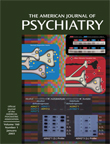Testosterone Gel Supplementation for Men With Refractory Depression: A Randomized, Placebo-Controlled Trial
Abstract
OBJECTIVE: Testosterone supplementation may produce antidepressant effects in men, but until recently it has required cumbersome parenteral administration. In an 8-week randomized, placebo-controlled trial, the authors administered a testosterone transdermal gel to men aged 30–65 who had refractory depression and low or borderline testosterone levels. METHOD: Of 56 men screened, 24 (42.9%) displayed morning serum total testosterone levels of 350 ng/dl or less (normal range=270–1070). Of these men, 23 entered the study. One responded to an initial 1-week single-blind placebo period, and 22 were subsequently randomly assigned: 12 to 1% testosterone gel, 10 g/day, and 10 to identical-appearing placebo. Each subject continued his existing antidepressant regimen. Ten subjects receiving testosterone and nine receiving placebo completed the 8-week trial. RESULTS: The groups were closely matched on baseline demographic and psychiatric measures. Subjects receiving testosterone gel had significantly greater improvement in scores on the Hamilton Depression Rating Scale than subjects receiving placebo. These changes were noted on both the vegetative and affective subscales of the Hamilton Depression Rating Scale. A significant difference was also found on the Clinical Global Impression severity scale but not the Beck Depression Inventory. One subject assigned to testosterone reported increased difficulty with urination, suggesting an exacerbation of benign prostatic hyperplasia; no other subject reported adverse events apparently attributable to testosterone. CONCLUSIONS: These preliminary findings suggest that testosterone gel may produce antidepressant effects in the large and probably underrecognized population of depressed men with low testosterone levels.



